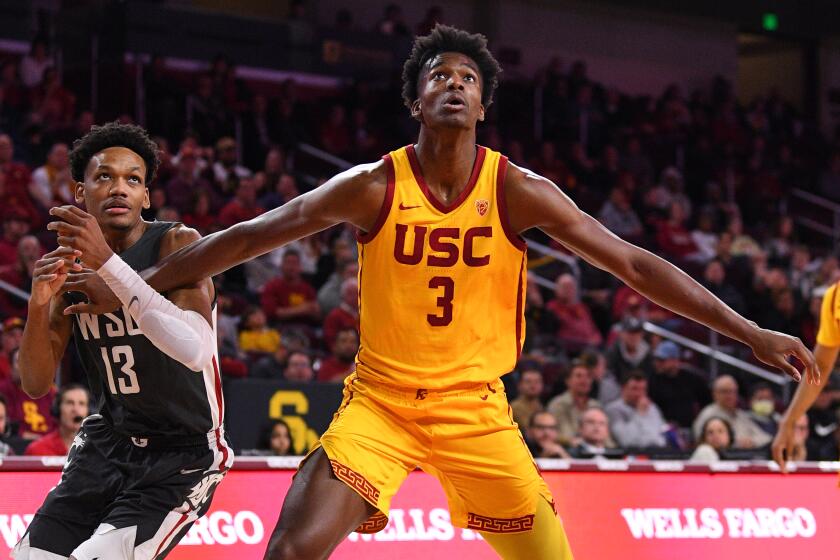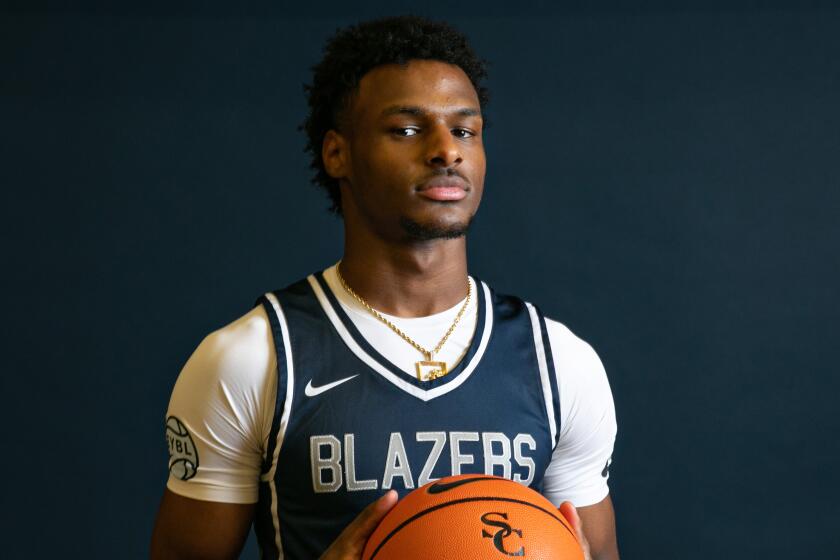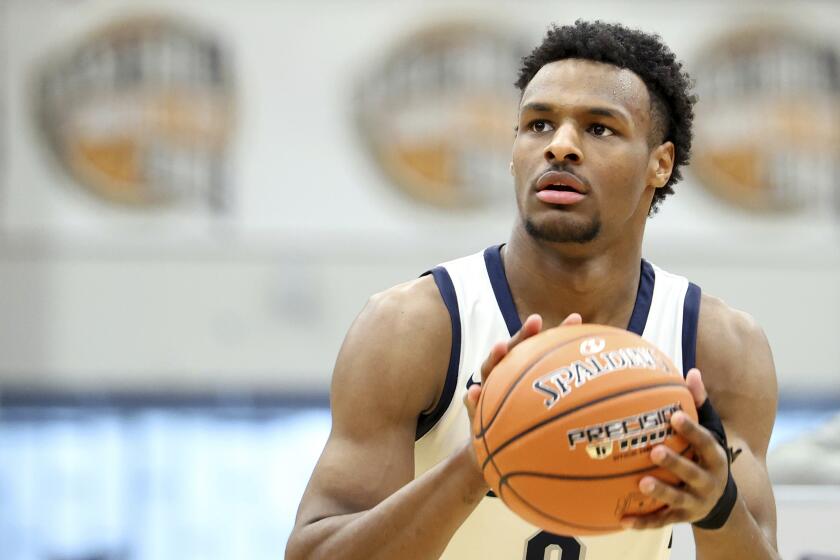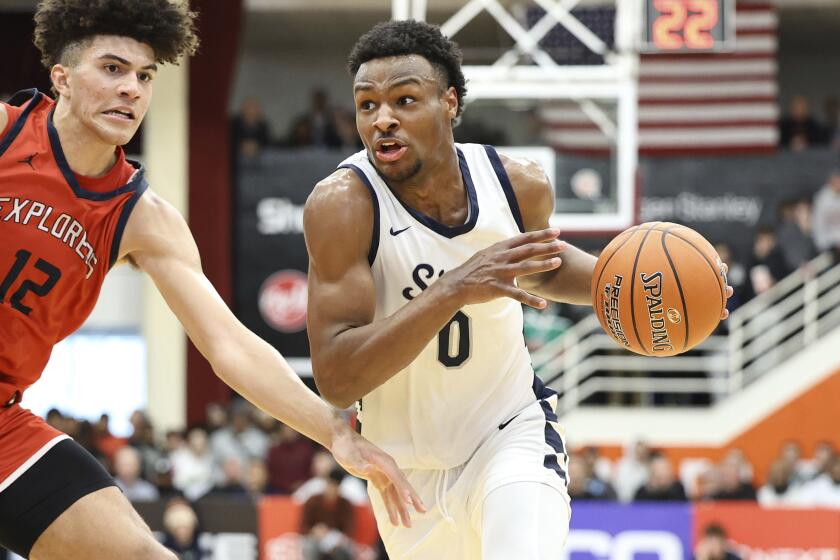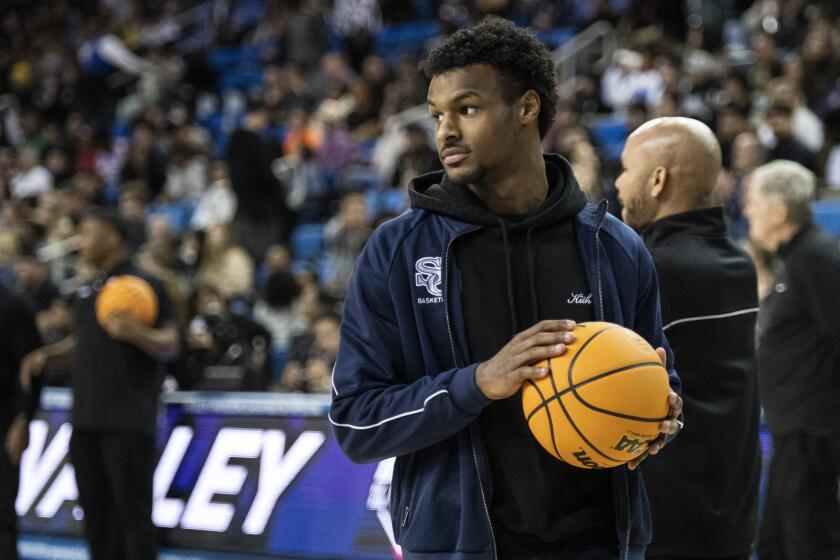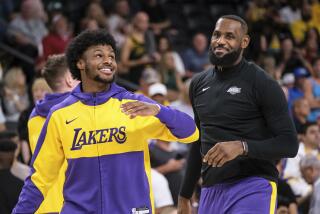Vince Iwuchukwu’s collapse helped prepare USC staff to treat Bronny James’ sudden cardiac arrest
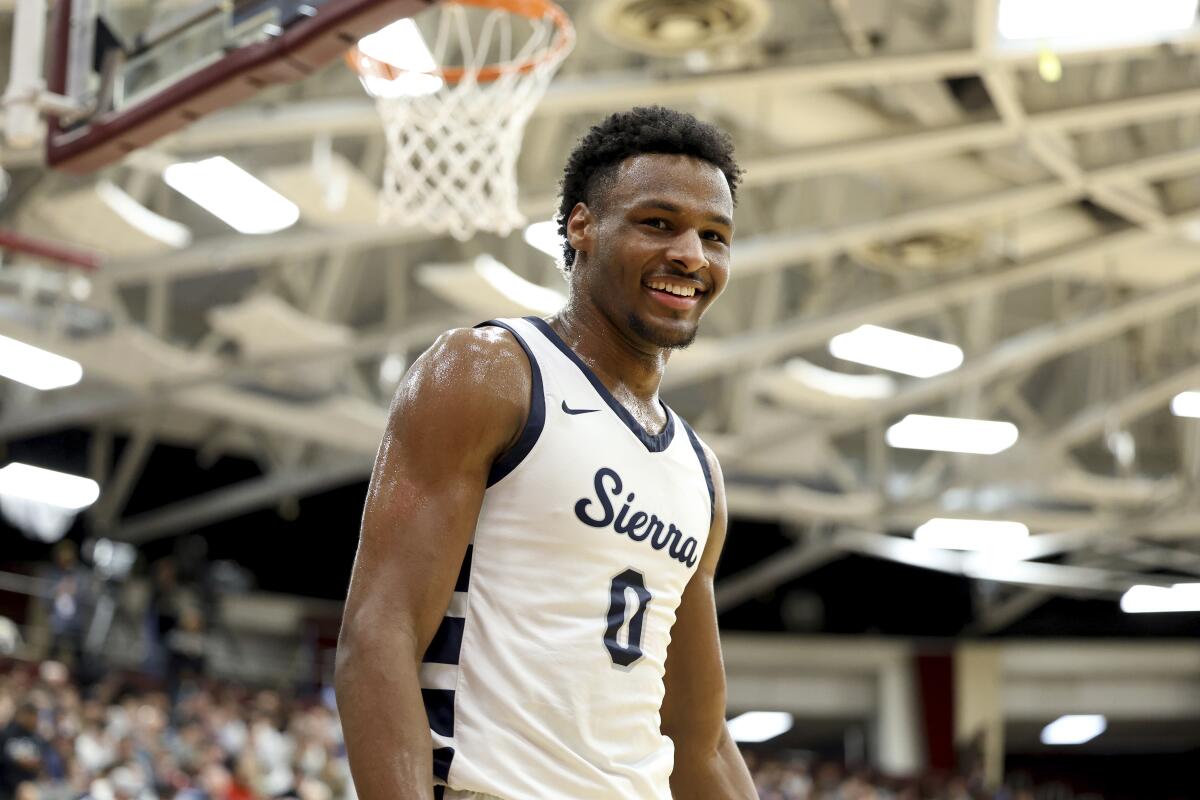
- Share via
When Vince Iwuchukwu collapsed on the court during a summer workout at Galen Center on July 1 last year, USC’s training staff rushed to revive the 7-foot freshman whose heart had stopped suddenly.
A trio of certified athletic trainers converged on Iwuchukwu and began administering CPR. One staff member called 911. Another retrieved the automated external defibrillator (AED) that hangs in a hallway off the main court. The speed with which the USC’s staff reacted ultimately saved Iwuchukwu’s life — and later allowed for him to resume playing competitive basketball.
The frightening incident gave USC’s staff experience handling sudden cardiac arrest when freshman Bronny James, the eldest son of Lakers star LeBron James, suffered a life-threatening cardiac event Monday morning during a summer practice at Galen Center.
How did USC and Vincent Iwuchukwu find a way to get the game-changing player back on the court after he suffered cardiac arrest during preseason practice?
James, 18, is currently in stable condition, according to a spokesperson for the James family. He was able to check out of the intensive care unit within 24 hours of his arrival at the hospital, a sign that two cardiologists told The Times was “really promising” for the young prospect’s long-term prognosis.
Dr. Michael Ackerman, a genetic cardiologist with the Mayo Clinic, said that James’ short stint in the ICU suggests USC’s response to his sudden cardiac arrest was “masterfully executed.”
Few details have been publicly released about what caused James’ heart to stop or what happened prior to an ambulance arriving at Galen Center on Monday morning. But in any case of sudden cardiac arrest, the few minutes before the ambulance arrives can make the difference between life and death.
The Times spoke with three cardiologists who did not have direct knowledge of James’ treatment, but spoke generally about treatment of cardiac arrest.
“If you don’t shock the heart to a normal rhythm, the patient isn’t going to make it,” said Dr. Shephal Doshi, the director of cardiac electrophysiology and pacing at Providence St. John’s Health Center in Santa Monica. “And you have minutes to do it.”
In Iwuchukwu’s case, it took less than a minute for one trainer to begin performing CPR, while another unwrapped the AED and attached its pads to Iwuchukwu’s chest. The device measured his heart‘s rhythm and determined a shock was needed.
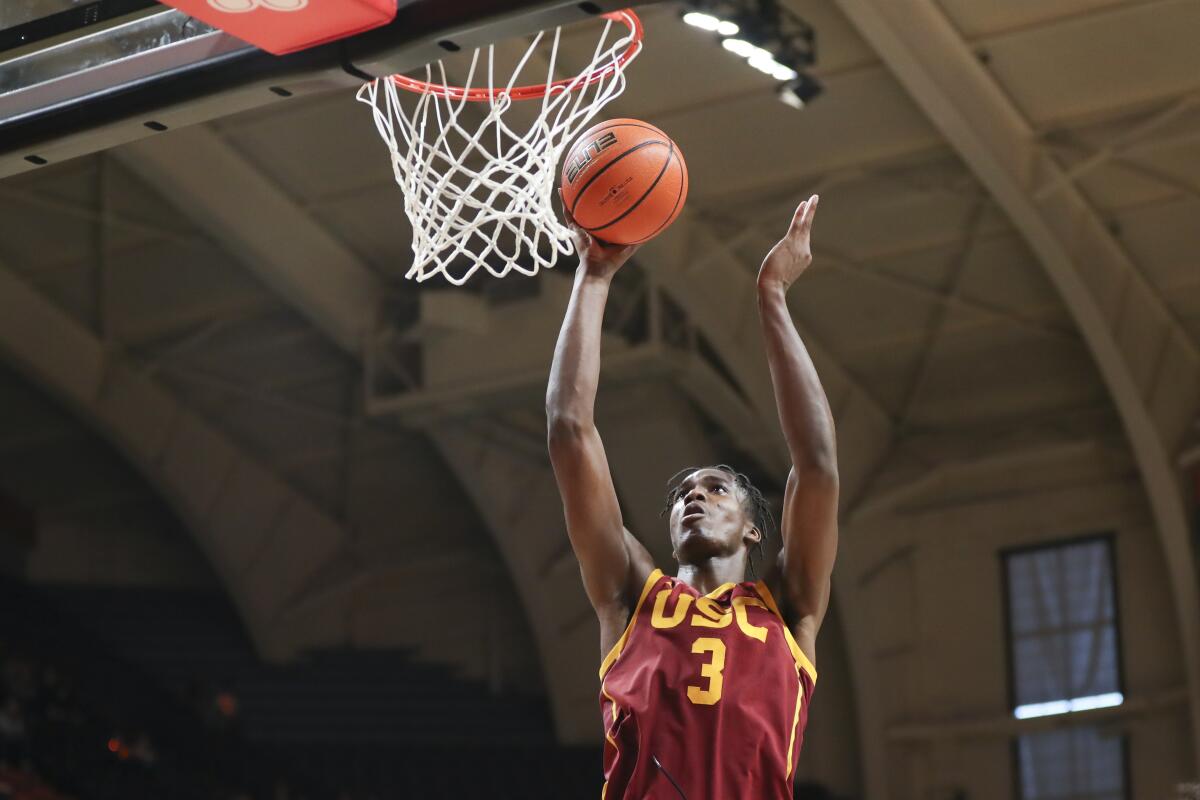
When the AED was deployed, Iwuchukwu instantly regained consciousness. His eyes opened wide and he let out a loud wail. He was awake as the ambulance arrived and even called his mother on the ride over.
“With something like this, where it’s a life-or-death situation, to perform under pressure and do what they’re trained to do at that level, it’s really just incredible,” USC coach Andy Enfield said of the Trojans’ medical staff earlier this year. “They gave Vince just such incredible care, as quickly as could be possible in a situation like that.”
The 911 call following James’ cardiac arrest was made at 9:26 a.m. Monday. James lost consciousness sometime in those minutes between his cardiac event and the ambulance arriving, a source not authorized to speak publicly about the incident told The Times. Emergency medical staff moved quickly, transporting James in expedited fashion — “Code 3, lights and sirens” — to Cedars-Sinai Medical Center, the source said.
How quickly someone regains consciousness after suffering sudden cardiac arrest is critical, said Dr. Cheng-Han Chen, medical director of Pacific Cardiovascular Associates Medical Group’s structural heart disease program at MemorialCare Saddleback Medical Center.
Complete coverage of Lakers star LeBron James’ son Bronny James suffering cardiac arrest during a USC workout. His family says he is in stable condition.
“After a few minutes without blood to your brain, you’re going to have problems in your brain,” Chen said. “That’s why every second counts. That’s why they have defibrillators.”
Once checked into the ICU, any patient who suffered from sudden cardiac arrest would presumably be put through a multitude of tests on their heart.
“There are a lot of things on the table here,” Doshi said, “but they should have an understanding fairly quickly of what caused it after they do a number of tests on the heart.”
It is unlikely tests will show how two seemingly healthy 18-year-old basketball players on the same team — James and Iwuchukwu — both suffered sudden cardiac arrest a little more than one year apart unless they didn’t receive proper screenings to determine whether they had a predisposition to heart issues.
“Is it just random luck that they’ve had two in a year? Or is it something that’s lacking in the screening process?” Doshi said. “We don’t want to make those assumptions, but it’ll be very clear once we have a diagnosis with Bronny whether this is something that should’ve been picked up with screening or not.”
College athletes ought to be some of the fittest people around. So what would cause a young, healthy person to suffer sudden cardiac arrest?
According to Ackerman, 5,000 to 10,000 people ages 1 to 25 suffer from sudden cardiac events every year. At least 1 in every 200 people, he said, are estimated to have a genetic predisposition to such an event.
“Many of these cardiac arrest survivors, you could have screened them every day, including 10 minutes before the collapse happens, and they would’ve passed all of our screening tests with flying colors,” Ackerman said.
Two of the three cardiologists who spoke to The Times agreed the most likely explanation was a genetic heart condition, but there are exceptions. When Buffalo Bills safety Damar Hamlin collapsed on the field from sudden cardiac arrest last season, it was due to an exceedingly rare event, commotio cordis, which is caused by a blow to the chest.
Whatever caused James’ cardiac event, the freshman is likely to have a long road ahead to return to the basketball court — if he’s able to return at all.
LeBron James thanked USC staff for treating Bronny James when he suffered cardiac arrest, but LAUSD athletes are unlikely to get comparable aid.
Iwuchukwu was told soon after he suffered cardiac arrest that he’d never play basketball again. But a different doctor offered a more hopeful prognosis. Iwuchukwu had surgery to install an implantable cardioverter-defibrillator (ICD) in his chest, which would allow USC to monitor his heart rate at all times. If he were to suffer a sudden cardiac arrest again, the ICD could give his heart a jolt to help regulate it.
Within six months, Iwuchukwu was back on the court. It would take several more weeks of ramping up before he was anywhere close to full strength.
That timeline may be totally different for James, depending on the severity of his cardiac event. Or it may end his playing career.
Those details are still to be determined. What we do know is that James, like Iwuchukwu, is alive today thanks to a swift response by USC’s medical team.
Bronny James, a USC basketball freshman and son of LeBron James, suffered a cardiac arrest at practice. Magic Johnson and others offer their support.
More to Read
Go beyond the scoreboard
Get the latest on L.A.'s teams in the daily Sports Report newsletter.
You may occasionally receive promotional content from the Los Angeles Times.

